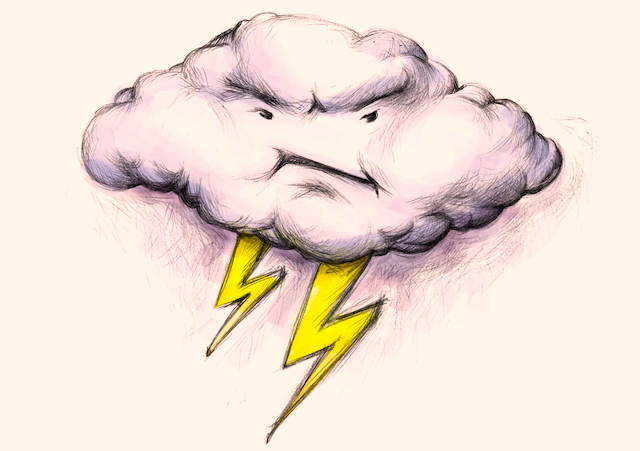
“Anger is like a storm rising up from the bottom of your consciousness. When you feel it coming, turn your focus to your breath.” ~Thich Nhat Hanh
There is an elderly lady—I’ll call her Ms. A—living in my mum’s village. She regularly shouts at people as they pass by her house walking their dogs.
She can be quite intimidating really. She even followed my mother up the road on one occasion, much to Mum’s alarm. My mum, unlike me, now avoids walking past her house, even though it’s a good route for her to take when walking her dog.
Ms. A has also shouted at me and called me names on a number of occasions. The thing is, I know Ms. A has mental health issues, and I have remarked to my mum how much she must be suffering, poor lady, and needs our understanding rather than our condemnation.
But on this particular day, all my good thoughts and intentions went right out the window.
I’m embarrassed to say that when she came over to shout at me, instead of walking by like I usually do, I went right up to her and shouted angrily back.
I became the intimidator then, telling her, in no uncertain terms, that she really must leave my mum alone and also stop shouting at me and calling me rude names when I walk by on the public road. I said I would report her for harassment if she didn’t stop.
She shouted back at me, of course. She also looked rather alarmed.
After I finished my rant, I resumed my walk, shaking. I felt absolutely rotten—guilty, ashamed, sad, and embarrassed. I was horrified at my reaction.
It was an uncomfortable walk home to my mum’s that day. I knew I hadn’t helped the situation at all. So much for my understanding and compassion!
So what went wrong? When I looked within, I realized I’d approached the house thinking a number of unhelpful thoughts due to my desire to protect my mum and my perception of being wronged. Some of my thoughts included:
How dare this woman intimidate my mum?! I really should put her in her place and stop her from doing it again. And how dare she say those rude things to me?!
It’s a public road; I’m doing nothing wrong by walking here. She’s the one in the wrong, not me, so I have the moral high ground! Yes, I’ll sort this situation out once and for all—I’ll tell her!
All these stormy thoughts were racing around my head as I neared her house. Looking back, I also realize how much I always dreaded walking by there. I didn’t like getting shouted at, but I didn’t want to change my route either, as that seemed unfair.
All this was a heady mix of thoughts and emotions, and more than enough to initiate a storm.
By the time I reached her house, where she was standing, seemingly waiting for me, the storm hit, and I was lost to it.
It certainly wasn’t my finest hour, but I learned a lot about myself in the subsequent analysis of the whole sorry incident.
I realized that my reaction had come from a place of darkness, a place where my own distress lurked, and that shining a light on it would help to illuminate a much better way to respond in the future.
I also realized that it had been a premeditated outburst, in the sense that my thoughts had helped whip it up. I saw too that I had gotten it all wrong: my thinking and perceptions were faulty. Ms. A was limited in her ability to control herself, due to her mental illness, and she really wasn’t a threat to either my mum or to me.
I could also see and understand why this storm had arisen and what was at the root of it. This led to me feel more compassion for myself, which in turn helped me to face, and also own up to, my angry outburst.
I once wrote about a tree I had walked by in the forest. It was crowded by other trees, and it had curved its way around them to reach up to the available sky. I realized that this curved tree hadn’t gotten caught up in how unfair the situation was; it had just gotten on with things and found the light it needed.
This nature lesson advises us to ‘curve around’ more when a situation calls for it.
By this I mean refusing to get caught up in a “that’s not fair!” mentality or get worked up over things that are of little consequence in the big scheme of things. This isn’t a helpful way to live our lives: it causes a lot of unnecessary stress.
I’m not saying that we should just roll over or back down all the time; rather that it would be much better for us to not rush into situations without thinking things through carefully and dispassionately beforehand. I’m all for being (calmly) assertive when it’s required.
It’s about looking at the bigger picture and taking a more balanced and less inflexible approach to life.
Thinking about Mother Nature and anger storms, another lesson occurs to me: nature doesn’t take revenge.
Even though we can sometimes think that nature must be angry with us and is hitting back at us with devastating storms, floods, and hurricanes, in reality it is just in the process of bringing balance back to the planet.
Please note, I am not denying the immense human and animal suffering such events cause. My point is that nature bears no dark ulterior motive—it isn’t taking its revenge on us.
Nature doesn’t think to itself that we need bringing down a peg or two; that we are getting out of hand and need to be punished. It isn’t reacting from a place of aggression. It just does what it needs to do to survive the best way it can. These storms are not sent as a personal attack on us.
And that’s the problem with our own angry reactions; they often come about because we take things so personally.
We can feel that we are personally under attack in some way and then go on the attack ourselves. Tit for tat. Not a good idea, as things escalate—they always do!
If we can learn to step back and realize that someone’s anger has everything to do with their own suffering, rather than with us, we may be able to take things less personally and not feel the need for revenge.
We may (or may not) need to take some action, but if we do, we can do it from a place of non-aggression, like Mother Nature. We can also do it from a place of clarity and calm. For this, we need to stop, focus on our breath, and let the storm clouds pass.
I learned a lot about myself that day, stuff I didn’t really want to own up to. But I did, and I’m grateful for the lessons.
Next time I will be more mindful of my thoughts and not let them whip up an unnecessary storm. And if storm clouds start to rise up, I’ll focus on my breath and walk on by. I’ll look at what’s happening inside me and remember, too, to take on board the other person’s distress.
I’ll also take a leaf out of nature’s book on responding to stressful situations: I’ll curve around when I think it’s the best approach and try not take things so personally.
Angry thundercloud image via Shutterstock
About Ros Hunwicks
Ros Hunwicks is a nature-inspired writer, stress coach, and creative soul who helps people to create more calm and balance within their lives, inspired and guided by healing nature. She currently writes a blog on her website www.wildcherrycoaching.co.uk combining stress management tips with insights and learning drawn from nature. An e-book and e-course incorporating this approach are also available.













 Though I run this site, it is not mine. It's ours. It's not about me. It's about us. Your stories and your wisdom are just as meaningful as mine.
Though I run this site, it is not mine. It's ours. It's not about me. It's about us. Your stories and your wisdom are just as meaningful as mine. 